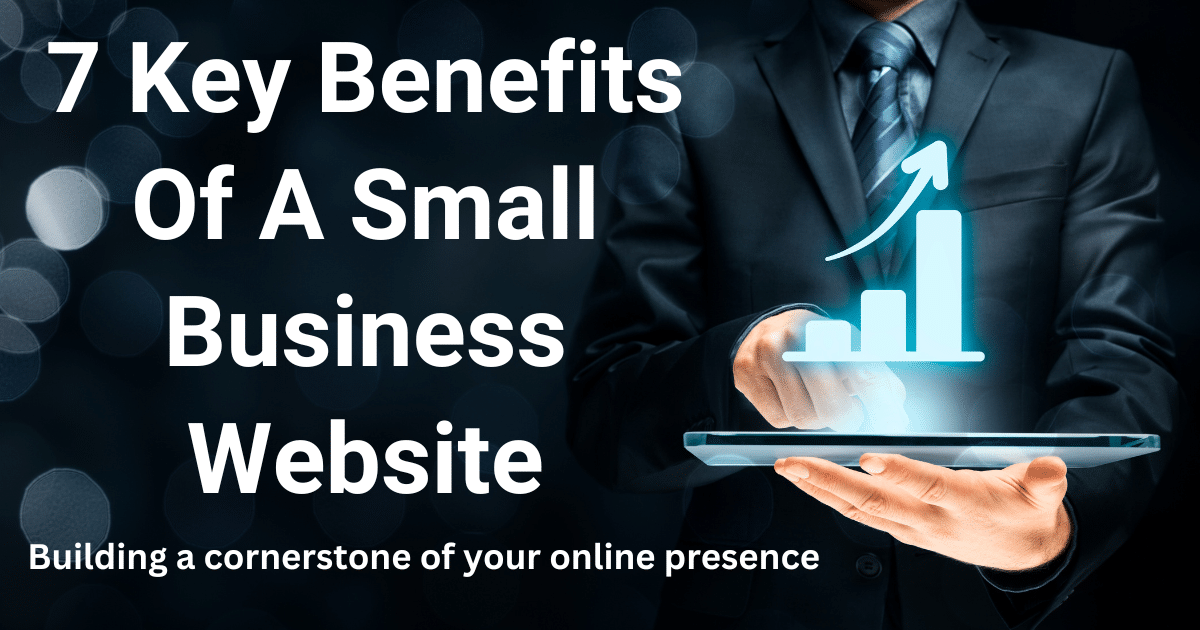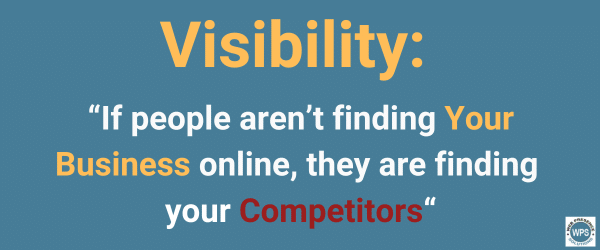A small business website is a cornerstone for digital marketing and the online presence of a business. Yet, amazingly enough, almost 30% of small businesses don’t have a website.
This post will explore the benefits of a website for a small business and how a website helps build your business and brand.
A key reason you need a small business website is competition. 27% of businesses don’t have a website which means 73% do have a website. That 73% includes your direct competitors.
The digital age has invented and reinvented exciting and revolutionary ways for small businesses to compete with more prominent firms.
And it all begins with a simple yet compelling small business website.
Do I need a Website For My Business?
It’s a valid question. Especially if you are part of the 27% of small businesses without a website or perhaps part of the business segment with a website that hasn’t been updated in several years,
This post will help you answer that question.
To be accurate, a website does require an initial investment for design and development. There will also be smaller ongoing costs for maintenance and updates.
However, getting an initial website up and running is not as daunting a project as it might seem.
Here are 7 benefits of having a website for your business.
1. Increased Business Website Visibility and Discoverability
Online visibility is a crucial factor in how new customers find your business, products, and services. Having a small business website provides visibility in Google and other search engines.
Not having a website or having a poorly designed or maintained website impacts a business. Recent research indicates that “81% of shoppers choose to research a business online before making a purchase, with almost 50% visiting the business’ website when researching.” (Source)
- When people search online, Google receives over 91% of all search traffic.
- For people searching on a mobile device, Google receives over 95% of search traffic. (Source)
To put that into perspective, Google consistently receives the most traffic of any website in the world. It leads by a huge margin. (Source)
- The Google website receives over 180 Billion visits per month.
- The second most visited website was YouTube, with 113 billion visits.
- The third-ranked website was the top social media network, Facebook, with 19 billion visitors. (Source)
That’s a huge difference between Google’s 180 billion website visitors per month and Facebook’s 19 billion monthly visitors.
In just the US, the traffic ranking for the top 4 websites are: (Source)
- Google with 35 billion monthly visitors
- YouTube 22 billion visitors
- Reddit 4 billion visitors
- Facebook with 3.7 billion visitors.
A well-optimized website can rank higher in Google search results and take better advantage of the enormous volume of searches taking place there every day. This allows your business to grow visibility with people searching for related products or services.
Additionally, by utilizing search engine optimization (SEO) strategies and tactics, you can leverage your website to further increase its online visibility.
The higher search rankings developed through SEO will translate into more website traffic, leads, and conversions.
2. Enhanced Small Business Credibility
How often have you encountered a business online and wondered, “Is this business legit”?
For large brands, this isn’t a problem. For small businesses, and especially for new companies, credibility and legitimacy can be the difference between a sales prospect buying from you or one of your competitors.
Frequently, a professional website is often the first point of contact with customers, regardless of the size of the business. This initial encounter with a sales prospect can shape their impression of your business, products, and services.
A website that is visually appealing, easy to navigate, and provides compelling information will generate a positive customer experience.
The perceptions of your business’ credibility and professionalism extend to sales referrals. When someone recommends your business to a friend, family member, or coworker, the first place they will look to learn more about it is your business website.
Additionally, a small business website builds credibility by your business showing up in other locations beyond just search engines. These places can include:
- Online business directories such as Google Business Profile, Yelp, Apple Business Connect, Yellow Pages, MapQuest, and dozens others.
- Industry-specific directories.
- Social media platforms including Facebook, YouTube, Instagram, Twitter, and LinkedIn.
- Reviews sites.
- Forums and other online communities.
The broader the number of locations where your business is visible helps further develop trust and credibility. And all these locations will link back to the cornerstone of your online presence – your small business website.
3. Relatability To Your Business And Brand
The ability to relate to a defined audience and build relationships is a game-changing benefit of creating and maintaining a small business website. The relationship begins by using your site to tell a story about you and your business.
Understanding your audience and how your products or services could benefit them continues to strengthen the relationship.
Additionally, a small business website is a powerful tool for:
- Developing and reinforcing your brand identity
- Providing consistent visuals, branding, and messaging
- Delivering a cohesive, uninterrupted view of who your business is and what you offer.
Your website only shows information about your business, products, and services. Unlike most social media and e-commerce sites, visitors to your website don’t see products or ads for any of your competitors.
Using your website to earn and retain a customer is the ultimate goal and the result of successfully relating to and serving the customer.
Consumers are more likely to visit your website to learn about your business than to pick up the phone and call. Likewise, replying to emails and social media comments are also great ways to build trust and personalize your small business experience.
4. Business Flexibility and Scalability
Two key benefits of your business website are its flexibility and ability to scale as your business grows.
Your business will change over time. Your website can evolve cost-effectively even as your products, services, target audience, or branding change.
Perhaps your business began by serving a local community. Maybe your brick-and-mortar business would like to expand to a larger market and geographical area.
The ability to expand the market scope of a small business is one of the most lucrative benefits of creating a small business website.
How Do Websites Change & Scale
Easy-to-use website platforms like WordPress and Wix are user-friendly even on mobile devices.
Plus, they allow for content to be updated as frequently as needed. Examples of these changes include location information, business hours, and pricing. These edits can be done at any time for little or no cost.
Handling Increased Traffic and Demand For Growth
As a small business becomes more popular, its website can experience a surge in traffic. This is generally a good thing.
Websites can scale to accommodate increased demand without compromising performance. Elements of website scalability include:
- Upgrading hosting solutions
- Optimizing for faster load times and better performance
- Improving performance so that the site can handle higher volumes of transactions and traffic.
This aspect is particularly important for e-commerce sites, where the ability to handle a growing number of simultaneous transactions can directly impact sales and customer satisfaction.
Flexibility for New Features and Functions
Another benefit of a website is the flexibility to integrate new features and functionalities as the business grows. For instance, a small business might only need a basic informational website to start.
As the marketing budget, customer base, and digital strategy grow, a website provides the scalability to add new features, content, and functionality to expand the online presence.
Other features and functions that can be added to a small business website over time include:
- Calls to action (CTAs).
- A Blog.
- FAQs – Frequently Asked Questions for products, services, company policies, and your industry.
- Product, Service, and Informational Videos.
- Glossaries.
- Visual displays of the features and benefits of products & services.
Having the flexibility to keep your audience informed encourages solid relationships and keeps your customers returning. This increased exposure is crucial for attracting new customers and expanding market reach.
5. A Website Delivers Sales and Marketing Benefits
Websites provide a cost-effective platform for marketing and sales. This reduces reliance on more expensive traditional methods such as brochures, print ads, or direct mail.
Although a small business website serves many purposes, the main objectives are to:
- Connect
- Inform
- Engage
- Convert
The scalability of website marketing efforts allows small businesses to start with a modest investment and gradually increase their spending as they grow.
Additionally, these costs will be relatively small for the benefits of an expanded online presence.
Especially when compared to the significant expenses associated with advertising and other forms of marketing.
Marketing Strategies Using A Website
A website also allows for targeted strategies like SEO and content marketing, increasing ROI. A small business website is a critical element for marketing activities such as:
- Content marketing
- Email marketing
- Advertising
- Social media marketing
Plus, there are no ads to distract visitors and no displays or links to competitors like on social media properties or e-commerce stores like Amazon, Etsy, and Walmart.
It’s important to remember: You control your website and what content is shown to visitors.
Essential steps to build a website into a powerful marketing and sales dynamo include:
- Provide high-quality information with sufficient detail.
- Learn who your audience is.
- Determine what your target audience wants.
- Create a sales funnel that nurtures them through the sales process.
Search Engine Optimization – SEO
Search Engine Optimization is an important marketing benefit of having a small business website. Although people sometimes forget that SEO is marketing, it’s a key facet of any marketing plan.
Optimizing your website to be highly visible and search engine friendly is essential to building, maintaining, and marketing your brand and business presence online.
- As noted earlier, Google receives over 91% of all search traffic when people search online.
- For people searching on a mobile device, Google receives over 95% of search traffic.
To put that into perspective, Google consistently receives the most traffic of any website in the world. It leads by a huge margin. (Source)
- The Google website receives over 180 Billion visits per month. (Source)
These statistics highlight key aspects of online business visibility, including:
- A massive number of people use search engines to locate products and services.
- Having a website can bring visitors that won’t be reached without a website.
- Effective use of SEO within a website will bring additional visitors and customers.
Key Takeaway: Your competitors have websites and are found where you are not visible, if you don’t have a website.
In essence, the cost-effectiveness of websites for marketing and online visibility presents a significant advantage for small businesses.
Your business website allows you to compete in the marketplace, reach your target audience effectively, and grow your customer base without needing a large marketing budget.
A business’s success is about growth – growing your customer base, growing the number of products or services you provide, and growing how and where you sell your products or services.
6. Small Business Website Analytics
Unless you specifically ask each customer who comes through your retail or virtual door how they found you, you may not know what brought them to your business. You will have little information about the origin of your customer’s visit or which marketing campaigns work.
Collecting and analyzing information on website visitor activities can answer many of these questions.
Free Website Analytics Tools From Google
The power of analytics tools such as Google Analytics and Google Search Console provide a wealth of data and information about visitor activity and interests. Plus, those two tools are free.
Google Analytics provides a free, powerful, cloud-based solution for understanding the performance of your website and improving the results of your marketing activities.
85% of websites that use a traffic analysis tool use Google Analytics, according to web technology survey company W3Techs. (Source)
Insights into Customer Behavior and Interests
Using your small business website as a marketing and analytics tool will provide real-time data about:
- Audience demographics
- How visitors link to your site
- Volume of website visitors
- Which website pages are most visited
- How long a visitor spends on a web page
- How frequently visitors return to your website
- How long a visitor spends on your website
- And a wide range of other information about your website visitors.
Developing business and marketing strategies based on actual user data rather than assumptions can significantly improve their effectiveness.
Accessing and analyzing website analytics is a powerful tool for small businesses. It can help you understand your customer’s preferences, interests, and behavior.
One of the most significant advantages of having a website is the ability to collect and analyze data on how users interact with the site.
This information is invaluable in understanding what attracts visitors, keeps them engaged, and what might be causing them to leave.
This data-driven approach allows small businesses to make informed decisions about product development, marketing strategies, content creation, and website design.
7. Benefits Of A Small Business Website Over A Facebook Page
A Facebook page and other social media properties can be valuable tools for a business. They are free, anyone can set up an account, and little maintenance is required.
Many social media platforms also provide opportunities for reaching your target audience through advertising.
This provides the benefit of expanding your audience by reaching new market segments.
Social Media Challenges
At the same time, there are limitations to Facebook marketing. These include:
- You Don’t Own Your Facebook Page.
- Facebook has SEO limitations that can prevent a your page from ranking well within Google.
- A Website often has a higher level of business credibility than a social media property.
- The attention of visitors is fleeting on Facebook.
- The reach of your Facebook content is limited without spending on advertising.
- The rules and Terms of Use can change and you have little control over the changes.
- Ads and content from competitors can displayed within or near your content.
Important: Regardless of how you design or enhance your Facebook page, your page is still governed by Facebook’s rules. You don’t actually own your Facebook Page, and Facebook’s rules can change, sometimes quite significantly.
How A Small Business Website is Different From Facebook
A website gives your business complete control over your site’s content, functions, and design.
This allows you to develop your online presence based on your business needs and requirements, not bound by the rules of a social media company.
- Having your own website allows for greater customization and control over branding.
- The look and feel of your site is based on your logos, color schemes, and layouts.
- You can also create custom pages and display your products or services in ways that are best for your business.
It’s quite a bit different than a standardized Facebook layout.
Additionally, a website allows your business to access another vital aspect of online visibility – Search Engine Optimization (SEO). This is crucial for growing your business’s visibility in search engine results.
You Own Your Website Data
Owning a website means you have ownership of your data. With a Facebook page, you have limited data access and are subject to the platform’s data policies. Facebook controls what data you can see and how you can use it.
Finally, you can design your site to align with your business’s brand identity, including logos, color schemes, and page layout. This is much less feasible on a Facebook page due to its standardized format.
A distinct brand identity is essential for standing out in a competitive market and creating a memorable impression on your audience.
Conclusion – There Are Significant Benefits In A Small Business Website
A small business website is a key component of an online presence and an important tool for digital marketing. It is also key to remember that your direct competitors have websites.
Consequently, the decision to invest in a website for your business is a decision to invest in your business success. Not having a website puts your business at a competitive disadvantage.
With a basic, well-designed website and SEO strategies, your small business can achieve a level of visibility and credibility that rivals larger competitors.
If your small business doesn’t currently have a website, putting it on your short list of Things To Do will be an important step in unlocking business growth and expanding your business.
However, if you already have a small business website, but are not receiving all of the benefits explained above, it’s time for a Website SEO Audit. Contact Web Presence Solutions to learn how we can help.
Handpicked Related Posts from Our Blog (click on the icon)





